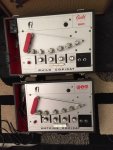AnalogRTO
Est. Contributor
- Messages
- 643
- Role
- Diaper Lover
- Incontinent
I'm an electronics engineer by trade here, designing power circuits and with 23+ years experience in the trade.gnd567 said:I have an electrical question and hope someone could help because I know nothing about this sort of thing.
I'm a professional guitarist and one of my main pieces of gear died, an old 70s tape-echo. Anyway, they were made in the UK and mine was one of the export models made for the US so it runs on normal US 110v power.
Anyway, since mine died, I had to find a replacement but the only one that I found that was in mint shape was a UK 220-240V model. I bought it anyway.
I also purchased a 500watt step up-step down transformer. My question is, will using it to power my British-made device be too much and trip the breaker? I can't afford to be tripping breakers at every gig because of my equipment.
I must admit I'm a little afraid to try it when it arrives because I don't want to ruin the machine or worse, electrocute myself. Any help would be much appreciated.
Do you happen to have a model number or schematic available for this? I could certainly give best advice based on information from the manufacturer that shows the internal circuitry. Other than that, I can give some general guidelines:
1. Going from 110V to the 220V through the transformer should not be a major issue unless the power draw on the item is too high. If it wants more than 500W of power, you won't be able to run it successfully off the transformer you have. The transformer core will saturate and you won't be able to get more power out of the transformer, things won't run properly. There might be a label on the device somewhere that tells how much power draw it takes in either watts (W) or amperes (A). Either way, you're not going to trip any breakers that you wouldn't have tripped with the old unit, the power draw is likely the same. Where the 110V may have taken 1A to run, the 220V model will take approximately half that, or 0.5A. No matter, the step-up transformer also limits how much power you can pull, and 500W is not enough to trip any normal household breaker.
2. The difference in 50Hz vs. 60Hz will not give an issue unless there is circuitry inside that specifically uses that frequency to do something. If the motor runs directly off the AC line based on the frequency, it will run faster here in the States. If instead it is a DC motor, then there is a circuit inside that converts the AC to DC and the motor won't see any difference. There are very few electronics that actually rely on the line frequency anymore, and a huge amount of modern electronics are designed to run from either 110V/60Hz or 220V/50Hz without needing anything to be done save ensure you have the right plug for the wall socket.
If you can get us some info on this thing, I can do some digging and see if I can come up with some specs or a schematic for it and give definitive answers on compatibility. Hell, with a schematic and an idea of what actually happened to the old one, it might even be repairable, 70's tech is much more easily repaired than anything modern. The older stuff was done with individual transistors (or tubes, depending on age) and components, items that can be easily replaced once the bad area is located. Newer stuff just runs straight into a custom IC, where it's easier to just replace an entire board or get a new item (I should know, I repair my own test equipment).

